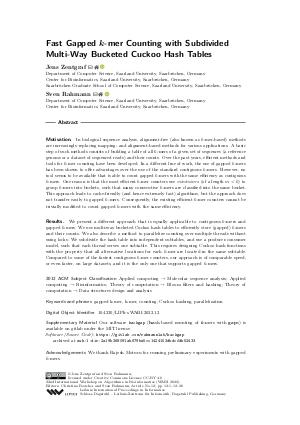@InProceedings{zentgraf_et_al:LIPIcs.WABI.2022.12,
author = {Zentgraf, Jens and Rahmann, Sven},
title = {{Fast Gapped k-mer Counting with Subdivided Multi-Way Bucketed Cuckoo Hash Tables}},
booktitle = {22nd International Workshop on Algorithms in Bioinformatics (WABI 2022)},
pages = {12:1--12:20},
series = {Leibniz International Proceedings in Informatics (LIPIcs)},
ISBN = {978-3-95977-243-3},
ISSN = {1868-8969},
year = {2022},
volume = {242},
editor = {Boucher, Christina and Rahmann, Sven},
publisher = {Schloss Dagstuhl -- Leibniz-Zentrum f{\"u}r Informatik},
address = {Dagstuhl, Germany},
URL = {https://drops.dagstuhl.de/entities/document/10.4230/LIPIcs.WABI.2022.12},
URN = {urn:nbn:de:0030-drops-170467},
doi = {10.4230/LIPIcs.WABI.2022.12},
annote = {Keywords: gapped k-mer, k-mer, counting, Cuckoo hashing, parallelization}
}

 Creative Commons Attribution 4.0 International license
Creative Commons Attribution 4.0 International license













